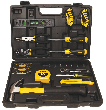Whether your clogged toilet is completely inhibiting complete draining or just slowing it down, it is important to find and fix the problem promptly so that damage doesn't occur. There are only a few items you will need, a few skills you will need, and a little courage to easily fix your clogged toilet.
If you are reading this article as your toilet is overflowing you should first locate the water faucet at the base of the toilet. The knob is metal and normally shaped like a giant almond; turn this knob forcefully to the left to stop water from filling the tank, flowing into the bowl, and overflowing onto the floor (and your feet). Now that the water is stopped you can begin concentrating on how to clear the clog. You may need to take a trip to your local hardware store or you may be able to find the needed items lying around your house. You will need rubber or latex gloves, a plunger, a hanger, and a bucket.
Before beginning, you may wish to place old towels around the base of the toilet along with a bucket to catch any water that may be displaced in the process of unclogging your toilet. Put on your latex or rubber gloves and get to work!
First, take a look at your toilet bowl; this is the part of the toilet upon which you sit and that collects waste before flushing. At the bottom of the bowl is the drain, where the waste "disappears" when you flush. Place the plunger into the bowl, seating it firmly in the drain area. The purpose of the plunger is to apply pressure to whatever is stuck in the drain, and you need to have that "firm seating" in order to build the pressure.
Now push downward on the plunger's handle. If you have a good seal between the plunger and the sides of the toilet bowl, the pressure caused when you push is directed into the drain. If you don't have a good seal, you may see lots of bubbles or water (indicated by turbulence) around the edges of the plunger.
When you pull back on the plunger handle, it may feel as though it is sticking to the inside of the toilet. This is natural, and it helps to dislodge whatever is in the drain. Repeat the pushing/pulling action a few times. If you are successful in pushing the clog through the drain, your toilet bowl may automatically drain when you remove the plunger. If so, you are done and you can turn the water back on (if you turned it off) and flush the toilet a few times to wash everything down.
If the water in the toilet bowl still didn't drain, you may need to get a bit more "hands on" in your unclogging efforts. Use a small plastic glass or cup to scoop most of the water from the toilet bowl into the bucket. (This may be the grossest part of your project.) Leave about 2 inches of water in the bottom of the bowl, making sure the drain is completely full of water.
Now examine the drain area. Do you see anything stuck in there? (I still have memories of finding my kids' toys stuck in the toilet drain.) If so, reach in and pull out whatever it is. You can actually stick your hand down into the drain and feel for any obstructions. When you can't feel anything else there, repeat the plunging action (with the plunger) to help get through the clog.
If you are still not able to unclog the toilet, ever after plunging, bailing water, and removing obstructions, it may be time to call in a specialist. They can use strong equipment (such as a drain snake) to clear any obstructions. They may also need to remove the toilet from the floor to look for obstructions stuck in the toilet itself.
To reduce the chances of clogging up your toilet in the future, remember to avoid using excessive amounts of toilet paper, avoid flushing feminine hygiene products, and avoid flushing items too large to fit down the drain of the toilet.

Find the Right Tool Right Away Finally, a homeowner's set that includes all the tools needed to complete basic DIY projects at an affordable price! The tools are stored in a molded case for security and portability. Check out Stanley 65-Piece Homeowner's Tool Kit today!
Compared with all of the other plumbing repairs that you might need to make within your home, replacing or installing a ...
Discover MoreBathrooms can quickly become cluttered with towels, make-up, extra toilet paper and soap, but don't worry by using these ...
Discover MoreInstead of hiring an expensive carpenter to install you bathroom cabinets, why not save some money and do it yourself. ...
Discover MoreThere are currently no comments for this tip. (Be the first to leave your comment—just use the simple form above!)
Copyright © 2026 Sharon Parq Associates, Inc.
Comments